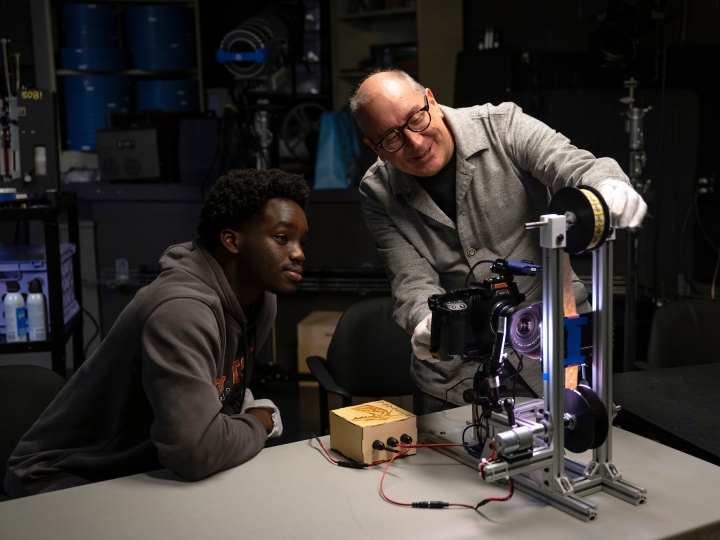Archive to Arctic
August 3, 2015
From a research desk in Canada's national archive in Ottawa, Bucknell Professor Andrew Stuhl will travel to the frozen reaches of the Arctic Circle.
Stuhl, a professor of environmental studies and a historian by training, has earned a Fulbright Visiting Research Chair award that will take him to Carleton University in the heart of Canada's capital. Less than two miles up Bronson Avenue is the Library and Archives Canada, where Stuhl will spend most of the spring 2016 semester poring over government records pertaining to a series of environmental laws that impact the North American Arctic.
"I'll be looking at materials from the 1970s — letters, reports and the like — to understand the Arctic of that time and how it relates to today," said Stuhl. "For me, it will be like traveling in the Arctic — it's just that I'll be doing it in a dusty corner in a library in Ottawa."
Getting from archive to Arctic might require some imagination, but it helps that Stuhl has set foot in the far north before. After earning his first master's degree in 2007, he spent a year working as a volunteer in the predominantly Inuit town of Inuvik, Northwest Territories, just inland of the Beaufort Sea and two degrees north of the Arctic Circle.
"I started talking to people about changes they were seeing locally due to climate change and heard a lot about ice roads melting sooner, the weather being more unpredictable and not knowing if the caribou were going to come around next year," he said. "All those things had been seen by other people and recorded by scientists. What perked my ears and set me on my research over the next five or six years, was talking with a local Inuit man. He said, 'This isn't the first time that we've seen changes like this and this isn't the first time that scientists and the outside government have tried to come in and tell us how to adapt to change.'"
That conversation provided a spark that has informed Stuhl's research since, which examines how science, policy and resource exploitation have impacted the landscape and life of the Arctic over time.
The big argument is that climate change is happening and we shouldn't ignore those changes. But what we also need to see in the Arctic are moral and ethical dimensions of life that are steeped in a colonial history of people going north and taking things from northerners."
Stuhl returned to the Arctic in 2010 for another year of research with a grant from the National Science Foundation. He conducted interviews and archival research in Inuvik and also traveled to archives in Yellowknife, Northwest Territories and Fairbanks, Alaska. Last summer, with support from the American Philosophical Society, he once again visited Inuvik to complete research for an upcoming book, Unfreezing the Arctic: A Century of Science, Intervention and Environmental Transformation, which examines historical patterns in the Arctic as they relate to the present reality of climate change.
His Fulbright-sponsored research will further that work by examining how a policy tool to incorporate ecological and local welfare concerns into decisions impacting the Arctic, the environmental assessment process, was developed and refined by U.S. and Canadian lawmakers from the 1970s through the 1990s.
"As we move forward from the 1990s to today, policymakers are aware of previous policies, so they're learning from each other and they're learning from time," Stuhl said. "Or are they? That's the question."
Examining why and how that process emerged is particularly relevant today, Stuhl said, as the ever-pressing reality of climate change has focused ever-greater attention on the polar region. In the rhetoric of innovation that surrounds climate change, the work put into the environmental assessment process is sometimes sidelined.
"There is a kind of media response to climate change that suggests there is no value of history," he said. "It isn't necessarily overt or explicit. But by saying, 'We need to innovate and we need to create new programs and develop new channels of decision-making,' the media effects the same kind of process that happened during the colonial era. Journalists intend to develop public awareness around climate change, but by ignoring these existing policy frameworks, they take away the space that was created for the voice of native northerners and other parties as well."
Stuhl hopes his findings will not only contribute to a better understanding of the Arctic, but also accentuate the value of history everywhere.
"The biggest misconception about the Arctic is the same misconception a lot of us have about nature in general: that is that it doesn't have a past," he said. "You look north and see an expanse covered in ice and think, 'There's no life here.' There are Inuit, but, to many southerners, they appear frozen in time. It is as if nothing happened here before. By really seeing history in this place that appears to have none of it, I want people to be able to look other places and understand the deep history that creates the present. The past is not just another time; it's constitutive of now."

